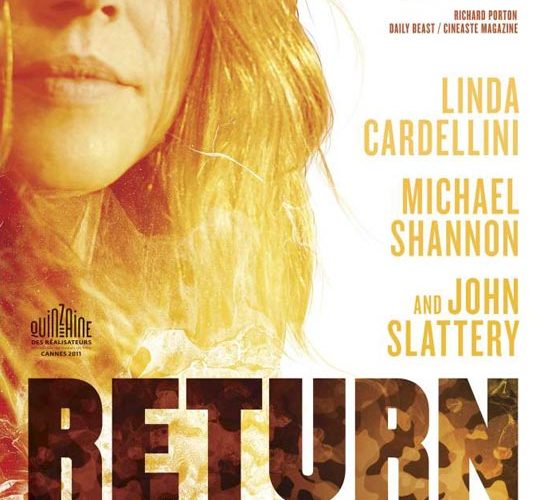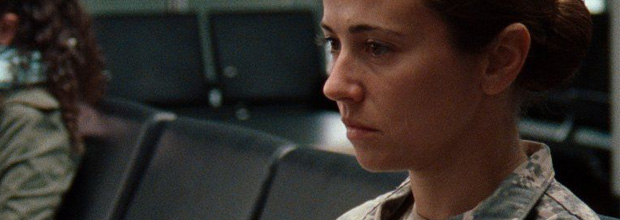War is hell.
This is a truism that is almost universally accepted and evinced by all pieces of serious-minded cinema and art in general. The other side of this idiom, however, is assumed to be that home is heaven. The return from war should be a moment of reprieve, of comfort and normality following an excursion into the darkest throes of human experience.
What doesn’t get said aloud, however, is that following a deployment, home can seem more like purgatory – a neutral and confusing mash-up of values and goals that are rendered alien and unfathomable to those who have seen something much worse. Return is a film that seeks to explore this idea, and succeeds in rendering a realistic and painfully dispassionate picture of a soldier’s attempt to find their place amongst the living after having, for all intents and purposes, returned from the dead.
Kelli (Linda Cardellini) is a member of the National Guard, returning to her life-long home for the first time since being deployed to an unnamed theater of war. She is happy to be back, seemingly eager to pick up her life where she left it so long ago. Her marriage is full of affection, she is loving and caring towards her children. She even returns to her old job with an enviable amount of enthusiasm. But small things begin to mount in the back of her mind. Her daughter’s cheerleading practice is a comical, meaningless spectacle. Her job becomes a pointless repetition. The walls of her house are an unpleasant color, but the effort it would take to repaint them isn’t worth the meager reward it would reap. Life, for Kelli, slowly turns into a mire of situations better left undealt with, a procession of ultimately purposeless encounters and events. What joy, or purpose, can life have when experience has bled from it all that you used to value?
Writer/director Liza Johnson approaches this story, seemingly well-trod in various other films, from a position almost completely free from political ideology or personal judgement. Unlike many such films in this vein of coming-home drama, Return never attempts to pontificate upon the reasons for the war, or the various political arguments for or against the conflict. The government and the policies behind the conflict do not matter nearly as much as the human toll taken on this one woman and her family. It is a rare film that has the courage to approach an unpopular war from a purely human standpoint, and yet Johnson achieves this delicate balancing act in her first feature.
Similar delicacy is taken with the characters, who are never judged for their actions, nor painted in broad and easily-defined strokes. There is no “good” or “evil” on display, only a humanist accounting of acts and consequences. This creates a narrative that is refreshingly free of proselytizing or agenda-pushing. Even the simpler social observations regarding what may or may not be important in life are invested with a kind of judgement-free magnanimity. Unburdened from the external clutter that usually weighs down most stories, we have a greater chance to grow to understand and empathize with the characters.
This is good news, because the centerpiece performance is a career best for Cardellini. Through her eyes, voice and posture we get the full picture of Kelli’s slow, but complete, descent into world-weariness and existential uncertainty before she can even voice her feelings aloud. It is a role that is complete without being showy, lacking in the histrionics that would usually plague an actor attempting to portray an emotional shift in such a physically expressive way. In fact, the subtlety of her performance adds to the general sense of Kelli’s isolation and guardedness in the face of a veritable parade of people who can’t help but ask “what happened?” She deflects with assurances that many had it worse than her and puts on a brave face, all the while blind to the fact that not having it as bad doesn’t mean it wasn’t bad enough.
Cardellini, while the apex, is not the only actor flexing their dramatic muscles to great effect. Michael Shannon turns in a reliably down to-earth and earnest performance as Mike, Kelli’s doting and loving husband. The toll of Kelli’s absence and growing disillusionment is reflected easily by Shannon, who creates a character whose honesty and fallibility is a pure equal to Cardellini. This a couple caught by consequences they cannot control, forced to take actions they could not have previously conceived. Into this picture walks John Slattery as Bud, a kindred soul to Kelli, a fellow soldier who can no longer connect with civillian life. Slattery makes Bud kind, humorous, but also deeply flawed. He is a confidante, a peer, though perhaps also a warning of what is to become of Kelli should she fail to embrace the need for expression beyond stolid denial.
In spite of these strengths there are moments when the story tends to drag, as is the risk with any film in which ennui and uncertainty are the focus. Kelli’s many episodic trials and excursions sometimes yield little more than snapshots of a town failing to thrive in the face of a staggered and stagnant economy, and while this theme does tie in to and exacerbate her own issues, it might have been handled with a bit more focus.
Still, even with this uneven pacing, there is much to admire in Return. For anyone who yearns for excellent performances and a moving narrative in everyday cinema, Johnson delivers an emotionally and morally complex story with clarity, certainty and a purity of purpose.
Return hits limited theaters on February 10th and on VOD beginning February 28th.




